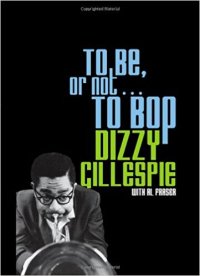______
Dizzy Gillespie — born 100 years ago today — recalls his childhood in this excerpt from his 1979 autobiography, To BE, or not…to BOP
*
The pictures show me as a very beautiful boy, but I was the last of nine children and my arrival probably didn’t excite anybody. So many people had been born at our house before. I don’t think Mama felt too blessed about having nine children, unless “blessed” means “wounded” like it does in French. She probably figured someone had put the bad mouth on us.
Every Sunday morning, Papa would whip us. That’s mainly how I remember him. He was unusually mean; and hated to see or hear about his children misbehaving. “Wesley! John! Come on and get your whipping!” He’d tell us good morning that way, sometimes before we could wake up good, and we’d have to go on up to him and take it. Papa was big and bad, waving that strap. Sometimes, I’d holler, “But I didn’t do nothing,” try to to duck him and hide up under the bed. As soon as I bent over and tried to get away, “Whack!” he’d hit me again; Papa never missed.
“Well, what did you do wrong?” people always ask when I tell them that my father used to beat me every Sunday. I have to explain it to them over and over again. They find it hard to believe that the whippings I got were for anything and everything that I’d done during the week because Papa was sure that I must’ve done something wrong in that span of time. Papa believed that a hard head made a soft behind. He treated us that way because he wanted us all to be tough and he turned me into a tought little rebel, very early, against everyone but him. He was a real man, who roared when he talked, because with so many kids around he had to be strong. I was scared of him, but after a while, I started doing some bad things to warrant all those whippings.
Only seven of us lived long enough to get a name. Edward Leroy (Sonny) my eldest brother was born in 1900, but he died in the thirties, before I moved to Philadelphia in 1935. Sonny left home when I was only six years old so I don’t actually remember him too well.
Mattie Laura, James Penfield, Jr. (J.P.), Hattie Marie, Eugenia, and Wesley were my other brothers and sisters. My parents, James and Lottie (Powe) Gillespie, christened me John Birks soon after my birth in Cheraw, South Carolina, on October 21, 1917.
*
Excerpted from To BE, or not…to BOP by Dizzy Gillespie, with Al Frazer

In 2004, I hosted a conversation, “Remembering Dizzy Gillespie,” with Nat Hentoff and James Moody that you may enjoy reading.





























what a sad childhood, but Dizzy and his music were wonderful. Amazing!